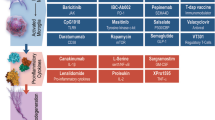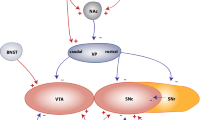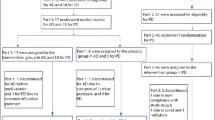Abstract
Rationale
Neuropsychiatric behaviours in Alzheimer’s disease (AD) patients have been associated with neocortical alterations of presynaptic cholinergic and muscarinic M2 receptor markers. In contrast, it is unclear whether non-M2 muscarinic receptors have a role to play in AD behavioural symptoms.
Objectives
To correlate the alterations of neocortical postsynaptic muscarinic receptors with clinical features of AD.
Materials and methods
[3H]4-DAMP were used in binding assays with lysates of Chinese hamster ovary (CHO) cells stably transfected with M1–M5 receptors. [3H]4-DAMP was further used to measure muscarinic receptors in the postmortem orbitofrontal cortex of aged controls and AD patients longitudinally assessed for cognitive decline and behavioural symptoms.
Results
[3H]4-DAMP binds to human postmortem brain homogenates and M1-, M3-, M4- and M5-transfected CHO lysates with subnanomolar affinity. Compared to the controls, the [3H]4-DAMP binding density is reduced only in AD patients with significant psychotic symptoms. The association between reduced [3H]4-DAMP binding and psychosis is independent of the effects of dementia severity or neurofibrillary tangle burden.
Conclusions
This study suggests that the loss of non-M2 muscarinic receptors in the orbitofrontal cortex may be a neurochemical substrate of psychosis in AD and provides a rationale for further development of muscarinic receptor ligands in AD pharmacotherapy.



Similar content being viewed by others
References
Andersen MB, Fink-Jensen A, Peacock L, Gerlach J, Bymaster F, Lundbaek JA, Werge T (2003) The muscarinic M1/M4 receptor agonist xanomeline exhibits antipsychotic-like activity in Cebus apella monkeys. Neuropsychopharmacology 28:1168–1175
Aubert I, Ar aujo DM, Cecyre D, Robitaille Y, Gauthier S, Quirion R (1992) Comparative alterations of nicotinic and muscarinic binding sites in Alzheimer’s and Parkinson’s diseases. J Neurochem 58:529–541
Bartus RT, Dean RL III, Beer B, Lippa AS (1982) The cholinergic hypothesis of geriatric memory dysfunction. Science 217:408–414
Blokland A (1995) Acetylcholine: a neurotransmitter for learning and memory? Brain Res Rev 21:285–300
Bodick NC, Offen WW, Levey AI, Cutler NR, Gauthier SG, Satlin A, Shannon HE, Tollefson GD, Rasmussen K, Bymaster FP, Hurley DJ, Potter WZ, Paul SM (1997) Effects of xanomeline, a selective muscarinic receptor agonist, on cognitive function and behavioral symptoms in Alzheimer disease. Arch Neurol 54:465–473
Callahan MJ, Kinsora JJ, Harbaugh RE, Reeder TM, Davis RE (1993) Continuous ICV infusion of scopolamine impairs sustained attention of rhesus monkeys. Neurobiol Aging 14:147–151
Caulfield MD (1993) Muscarinic receptors—characterization, coupling and function. Pharmacol Ther 58:319–379
Cummings JL, Back C (1998) The cholinergic hypothesis of neuropsychiatric symptoms in Alzheimer’s disease. Am J Geriatr Psychiatry 6:S64–S78
Cummings JL, Kaufer D (1996) Neuropsychiatric aspects of Alzheimer’s disease: the cholinergic hypothesis revisited. Neurology 47:876–883
Davies P, Maloney AJ (1976) Selective loss of central cholinergic neurons in Alzheimer’s disease. Lancet 2:1403
Donaldson C, Tarrier N, Burns A (1998) Determinants of carer stress in Alzheimer’s disease. Int J Geriatr Psychiatry 13:248–256
Eberlein WG, Engel W, Mihm G, Rudolf K, Wetzel B, Entzeroth M, Mayer N, Doods HN (1989) Structure-activity relationships and pharmacological profile of selective tricyclic antimuscarinics. Trends Pharmacol Sci Suppl:50–54
Ehlert FJ, Roeske WR, Yamamura HI (2000) Molecular biology, pharmacology, and brain distribution of subtypes of the muscarinic receptor. Psychopharmacology—the fourth generation of progress. American College of Neuropsychopharmacology, USA
Farber NB, Rubin EH, Newcomer JW, Kinscherf DA, Miller JP, Morris JC, Olney JW, McKeel DW Jr (2000) Increased neocortical neurofibrillary tangle density in subjects with Alzheimer disease and psychosis. Arch Gen Psychiatry 57:1165–1173
Felder CC, Porter AC, Skillman TL, Zhang L, Bymaster FP, Nathanson NM, Hamilton SE, Gomeza J, Wess J, McKinzie DL (2001) Elucidating the role of muscarinic receptors in psychosis. Life Sci 68:2605–2613
Fibiger HC (1991) Cholinergic mechanisms in learning, memory and dementia: a review of recent evidence. Trends Neurosci 14:220–223
Fisher A, Michaelson DA, Brandeis R, Haring R, Chapman S, Pittel Z (2000) M1 muscarinic agonists as potential disease-modifying agents in Alzheimer’s disease. Rationale and perspectives. Ann NY Acad Sci 920:315–320
Flynn DD, Ferrari-DiLeo G, Mash DC, Levey AI (1995) Differential regulation of molecular subtypes of muscarinic receptors in Alzheimer’s disease. J Neurochem 64:1888–1891
Flynn DD, Weinstein DA, Mash DC (1991) Loss of high-affinity agonist binding to M1 muscarinic receptors in Alzheimer’s disease: implications for the failure of cholinergic replacement therapies. Ann Neurol 29:256–262
Folstein MF, Folstein SE, McHugh PR (1975) “Mini-mental state”. A practical method for grading the cognitive state of patients for the clinician. J Psychiatr Res 12:189–198
Francis PT, Palmer AM, Snape M, Wilcock GK (1999) The cholinergic hypothesis of Alzheimer’s disease: a review of progress. J Neurol Neurosurg Psychiatry 66:137–147
Gilley DW, Bienias JL, Wilson RS, Bennett DA, Beck TL, Evans DA (2004) Influence of behavioral symptoms on rates of institutionalization for persons with Alzheimer’s disease. Psychol Med 34:1129–1135
Hardy JA, Wester P, Winblad B, Gezelius C, Bring G, Eriksson A (1985) The patients dying after long terminal phase have acidotic brains; implications for biochemical measurements on autopsy tissue. J Neural Transm 61:253–264
Hope T, Fairburn CG (1992) The Present Behavioural Examination (PBE): the development of an interview to measure current behavioural abnormalities. Psychol Med 22:223–230
Hope T, Keene J, Fairburn C, McShane R, Jacoby R (1997a) Behaviour changes in dementia. 2: Are there behavioural syndromes? Int J Geriatr Psychiatry 12:1074–1078
Hope T, Keene J, Gedling K, Cooper S, Fairburn C, Jacoby R (1997b) Behaviour changes in dementia. 1: Point of entry data of a prospective study. Int J Geriatr Psychiatry 12:1062–1073
Hope T, Keene J, Fairburn CG, Jacoby R, McShane R (1999) Natural history of behavioural changes and psychiatric symptoms in Alzheimer’s disease. A longitudinal study. Br J Psychiatry 174:39–44
IPA (1996) Behavioral and psychological signs and symptoms of dementia: implications for research and treatment. Proceedings of an international consensus conference. Lansdowne, Virginia, April 1996. Int Psychogeriatr 8(Suppl 3):215–552
Kashihara K, Varga EV, Waite SL, Roeske WR, Yamamura HI (1992) Cloning of the rat M3, M4 and M5 muscarinic acetylcholine receptor genes by the polymerase chain reaction (PCR) and the pharmacological characterization of the expressed genes. Life Sci 51:955–971
Koch HJ, Haas S, Jurgens T (2005) On the physiological relevance of muscarinic acetylcholine receptors in Alzheimer’s disease. Curr Med Chem 12:2915–2921
Ladner CJ, Celesia GG, Magnuson DJ, Lee JM (1995) Regional alterations in M1 muscarinic receptor-G protein coupling in Alzheimer’s disease. J Neuropathol Exp Neurol 54:783–789
Lai MK, Lai OF, Keene J, Esiri MM, Francis PT, Hope T, Chen CP (2001) Psychosis of Alzheimer’s disease is associated with elevated muscarinic M2 binding in the cortex. Neurology 57:805–811
Lai MK, Tsang SW, Francis PT, Keene J, Hope T, Esiri MM, Spence I, Chen CP (2002) Postmortem serotoninergic correlates of cognitive decline in Alzheimer’s disease. NeuroReport 13:1175–1178
Lai MK, Tsang SW, Francis PT, Esiri MM, Keene J, Hope T, Chen CP (2003) Reduced serotonin 5-HT1A receptor binding in the temporal cortex correlates with aggressive behavior in Alzheimer disease. Brain Res 974:82–87
Levey AI (1996) Muscarinic acetylcholine receptor expression in memory circuits: implications for treatment of Alzheimer disease. Proc Natl Acad Sci U S A 93:13541–13546
Marshall GA, Fairbanks LA, Tekin S, Vinters HV, Cummings JL (2006) Neuropathologic correlates of apathy in Alzheimer’s disease. Dement Geriatr Cogn Disord 21:144–147
Mash DC, Flynn DD, Potter LT (1985) Loss of M2 muscarine receptors in the cerebral cortex in Alzheimer’s disease and experimental cholinergic denervation. Science 228:1115–1117
McPherson GA (1985) Analysis of radioligand binding experiments. A collection of computer programs for the IBM PC. J Pharmacol Methods 14:213–228
Michel AD, Stefanich E, Whiting RL (1989) Direct labeling of rat M3-muscarinic receptors by [3H]4-DAMP. Eur J Pharmacol 166:459–466
Minger SL, Esiri MM, McDonald B, Keene J, Carter J, Hope T, Francis PT (2000) Cholinergic deficits contribute to behavioral disturbance in patients with dementia. Neurology 55:1460–1467
Mirra SS, Heyman A, McKeel D, Sumi SM, Crain BJ, Brownlee LM, Vogel FS, Hughes JP, van Belle G, Berg L (1991) The Consortium to Establish a Registry for Alzheimer’s Disease (CERAD). Part II. Standardization of the neuropathologic assessment of Alzheimer’s disease. Neurology 41:479–486
Ogawa N, Mizukawa K, Asanuma M, Kanazawa I (1993) Abnormalities in muscarinic cholinergic receptors and their G-protein coupling systems in the cerebral frontal cortex in Alzheimer’s disease. Arch Gerontol Geriatr 17:77–89
Pedder EK, Eveleigh P, Poyner D, Hulme EC, Birdsall NJ (1991) Modulation of the structure-binding relationships of antagonists for muscarinic acetylcholine receptor subtypes. Br J Pharmacol 103:1561–1567
Tekin S, Mega MS, Masterman DM, Chow T, Garakian J, Vinters HV, Cummings JL (2001) Orbitofrontal and anterior cingulate cortex neurofibrillary tangle burden is associated with agitation in Alzheimer disease. Ann Neurol 49:355–361
Tsang SW, Lai MK, Kirvell S, Francis PT, Esiri MM, Hope T, Chen CP, Wong PT (2006) Impaired coupling of muscarinic M1 receptors to G-proteins in the neocortex is associated with severity of dementia in Alzheimer’s disease. Neurobiol Aging 27:1216–1223
Tsang SW, Pomakian J, Marshall GA, Vinters HV, Cummings JL, Chen CP, Wong PT, Lai MK (2007) Disrupted muscarinic M1 receptor signaling correlates with loss of protein kinase C activity and glutamatergic deficit in Alzheimer’s disease. Neurobiol Aging 28:1381–1387
Van Hoesen GW, Parvizi J, Chu CC (2000) Orbitofrontal cortex pathology in Alzheimer’s disease. Cereb Cortex 10:243–251
Whitehouse PJ, Price DL, Struble RG, Clark AW, Coyle JT, Delon MR (1982) Alzheimer’s disease and senile dementia: loss of neurons in the basal forebrain. Science 215:1237–1239
Yasuda RP, Ciesla W, Flores LR, Wall SJ, Li M, Satkus SA, Weisstein JS, Spagnola BV, Wolfe BB (1993) Development of antisera selective for m4 and m5 muscarinic cholinergic receptors: distribution of m4 and m5 receptors in rat brain. Mol Pharmacol 43:149–157
Zavitsanou K, Katsifis A, Mattner F, Huang XF (2004) Investigation of m1/m4 muscarinic receptors in the anterior cingulate cortex in schizophrenia, bipolar disorder, and major depression disorder. Neuropsychopharmacology 29:619–625
Acknowledgments
This study was supported by the Singhealth Research Foundation (SRF/110/05) and the Singapore National Medical Research Council (NMRC/0932/2005). The authors acknowledge Dr. J. Keene and Prof. T. Hope for the help in obtaining the clinical data, and M.K.P. Lai would like to thank H.H. Ching for the helpful discussions.
Author information
Authors and Affiliations
Corresponding author
Rights and permissions
About this article
Cite this article
Tsang, S.W.Y., Francis, P.T., Esiri, M.M. et al. Loss of [3H]4-DAMP binding to muscarinic receptors in the orbitofrontal cortex of Alzheimer’s disease patients with psychosis. Psychopharmacology 198, 251–259 (2008). https://doi.org/10.1007/s00213-008-1124-9
Received:
Accepted:
Published:
Issue Date:
DOI: https://doi.org/10.1007/s00213-008-1124-9




